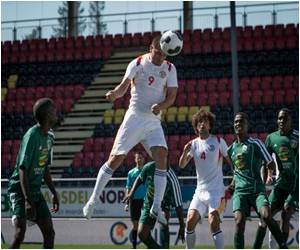Around the globe, the hangover goes like a Mexican wave - a trail of destructive and sometimes deadly celebration is left after every win and the World Cup 'sickie' has become an epidemic.

"We want peaceful celebrations. We must reject violence," said the mayor, Gustavo Petro. About 3,000 street fights were reported to police after the win in the city of eight million people.
In France, migrant Algerian fans poured onto the streets of Paris and other big cities after their country beat South Korea 4-2 on Sunday.
At least 28 people were arrested by police who fired flash balls to break up unruly crowds and in some cases were pelted with stones, police said. Dozens of cars were burned.
Alcohol is causing other World Cup tragedies. A drunken Mexican fan jumped off a cruise ship deck to his death after his country drew with Brazil. The ship was taking 3,500 Mexicans between the Brazilian cities of Fortaleza and Recife.
Hardly a country has escaped fallout from World Cup binge drinking.
Advertisement
Police in the Himalayan nation's capital, Kathmandu, seized the licenses of more than 400 fans in one week, said Basanta Pant, spokesman for the Kathmandu Traffic Police Division. That is twice the weekly average.
Advertisement
Some 5,200 cases of drunk driving were reported in China in the first three days of the World Cup, a 65% increase over the figure during the 2010 tournament, the official China Daily newspaper reported.
Traffic police will "conduct selective tests during daytime to keep hungover motorists off the roads," added the report.
- China's fake sick notes -
A time difference of up to 12 hours between China and Brazil has also given Chinese wheeler-dealers a lucrative opportunity to sell fake sick notes to World Cup fans staying up all night.
A search on Chinese search engine Baidu showed thousands of results for vendors providing photocopies of hospital certificates with official stamps and doctor's signatures in their "product catalogue".
World Cup absenteeism -- what the British famously call "throwing a sickie" -- is a widespread problem around the world.
Shamsuddin Baradan, executive director of the Malaysian Employers Federation, which represents the employers of about a third of the country's private sector work force, said employers were concerned about lower productivity and increased absences.
"The first week you may not feel anything but by the second, third and fourth week, we expect quite a high degree of negative impact," he told AFP, urging employees to be "selective" in the games they watch to reduce damage.
An earlier federation survey found that 56% of its members said they had been hit by absenteeism or productivity losses during the 2006 World Cup in Germany.
In Britain, the employment law specialists ELAS said that "'World Cup fever', the mystery illness that strikes once every four years" could cost the country's economy up to four billion pounds ($6.8 billion).
Its survey of 1,500 workers revealed that 13 per cent plan on "throwing a sickie" to watch matches and 43 per cent would take planned or unauthorised time off.
In Paris, Arnaud Monthlery, owner of a small restaurant, said that five of his nine staff failed to turn up the day after France beat Switzerland 5-2 on Friday night.
In Australia most of the games are played in the middle of the night. Fans' feelings were expressed in one Twitter comment: "MESSAGE TO ALL EMPLOYERS: Please be patient with weary staff today. They have endured a night of sporting drama."
Source-AFP










